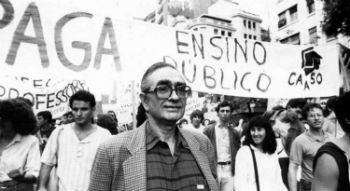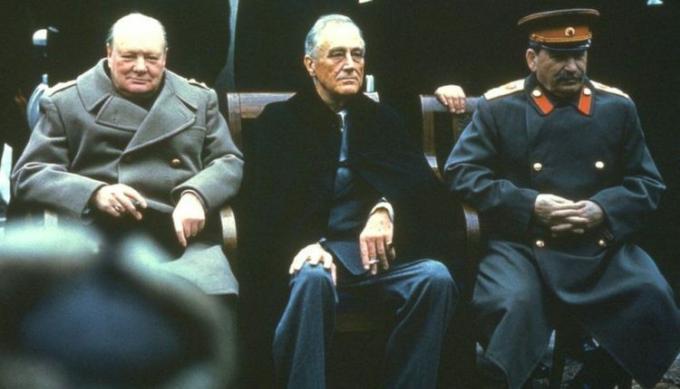Florestan Fernandes (1920-1995) was a sociologist, university professor, columnist and Brazilian deputy.
He was elected federal deputy for the Workers' Party for two terms (1986-1994) and participated in the 1988 Constituent Assembly.
Biography
Florestan Fernandes was born in 1920, in São Paulo, into a poor family. From an early age, he had to work to help support the household and did so as a barbershop assistant, shoeshine boy, butler, waiter.
However, thanks to his godmother Herminia Bresser de Lima, he learned the value of studying and acquired the discipline to study. This ambiguous life between the wealthy world and the world of poverty would permeate all his intellectual work and his attitude to life.
He entered the Faculty of Philosophy, Letters and Human Sciences at USP in 1941 and became an assistant to Professor Fernando de Azevedo. He received his doctorate in 1951 with the thesis entitled “The social function of war in Tupinambá society”.
He collaborated in several researches with the French Roger Bastide and had as students, among others, the former president
Fernando Henrique Cardoso and Octavio Ianni.With the arrival of the military dictatorship in 1964 and after the AI-5, Florestan Fernandes is compulsorily retired from USP. In this way, he goes to Canada and the United States to teach at different universities such as Columbia, Yale and Toronto.

Upon returning to Brazil, he actively participated in the political reopening, supporting movements such as the Direct now. In 1986, through the Workers' Party (PT), he would be elected as a federal deputy.
This gave him the opportunity to be part of the Education Committee that helped craft the 1988 Constitution, helping to write the Basic Guidelines Law (LDB).
Florestan Fernandes would still be reelected to the position in 1990, by the PT. A liver disease did not deprive him of the strength to collaborate or criticize with his party and other left-wing organizations.
Sociologist Florestan Fernandes died in 1995 after undergoing a liver transplant.
See too: LDB (updated in 2019)
Main Ideas
Most of Florestan Fernandes' work aims to understand the situation of blacks in Brazilian society.
Based on Marxist theory, Fernandes analyzes the insertion of black people when they changed from being property to being endowed with freedom.
From Fernandes' point of view, blacks would not have been integrated into capitalist society, as this group was the most disadvantaged compared to whites.
For Florestan Fernandes, the degree of integration of blacks into Brazilian society could be a parameter for Brazilian democracy
“Blacks will always be, as long as there is no democracy in Brazil, our best reference point to determine that Brazil is not a democratic society. (...) A democracy must be a political, economic, cultural, social regime that allows for the establishment of equality between all races.” (Interview for the Vox Popolli program, 1984).
racial democracy
Florestan Fernandes dialogued with the main Brazilian thinkers as Gilberto Freyre and Sérgio Buarque de Holanda.
Unlike Gilberto Freyre who defended the inclusion of blacks in Brazil through the mixing of Indians, whites and blacks, Fernandes moved away from this line of thought.
When studying the problem of blacks in the light of Marxism, Florestan Fernandes affirms that the black people will be the most harmed in the context of the class struggle. Even if whites are poor and proletarian, blacks will suffer the component of racial discrimination.
education
For Florestan Fernandes, education should be secular, free and liberating. It questioned the teacher's authority/authoritarianism in the classroom, his posture as a producer of knowledge and his role in the construction of an egalitarian society.
Instituto Florestan Fernandes
Several organizations bear the name Florestan Fernandes such as the Instituto Florestan Fernandes founded in 1999, in Ceará.
This NGO aims to promote citizenship and empower rural youth and urban women to develop their political and economic potential.
In turn, Fundação Florestan Fernandes, in Diadema, created in 1996, is a center that offers professional courses, putting into practice one of the sociologist's precepts.
Florestan Fernandes Library
The library at the University of São Paulo (USP) was named after the distinguished professor in 2005. However, all the sociologist's documentation has been under the custody of the Federal University of São Carlos (UFScar) since 1996.
Sentences
- An educated people would not accept the conditions of misery and unemployment as we have.
- Against the ideas of strength, the strength of ideas!
- The life of an intellectual in the mass consumer society is very complicated.
- I am a Marxist who thinks that the solution to the problems of capitalist countries lies in revolution.
- In our time, the scientist needs to become aware of the social utility and practical destiny reserved for his discoveries.
Construction
- Social organization of the Tupinambá, 1949;
- The social function of war in Tupinambá society,1952;
- Ethnology and sociology in Brazil,1958;
- Empirical foundations of sociological explanation,1959;
- Social changes in Brazil,1960;
- Folklore and social change in the city of São Paulo,1961;
- The integration of black people into class society,1964;
- Body and Soul of Brazil,1964;
- Class society and underdevelopment,1968;
- Dependent Capitalism and Social Classes in Latin America,1973;
- Ethnological investigation in Brazil and other essays,1975;
- The bourgeois revolution in Brazil: Essay on Sociological Interpretation,1975;
- From Guerrilla to Socialism: The Cuban Revolution,1979;
- What is Revolution,1981;
- Power and Counterpower in Latin America,1981;
- Meaning of the Black Protest, 1989.
read more:
- What is Sociology?
- Military Dictatorship in Brazil
- Black Consciousness
- black movement

